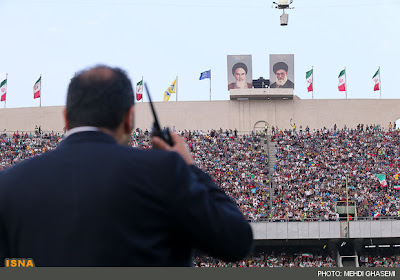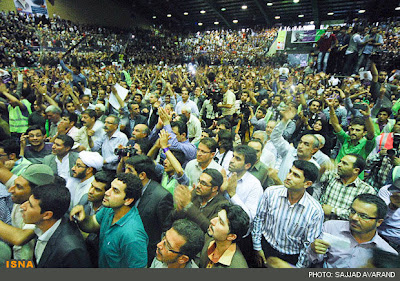BEHROOZ GHAMARI
 |
| Football crazed Iranians watched their team thrashing Lebanon. |
There was a great excitement in Blogistan about today’s game between Iran and Lebanon. Iran needed a big win in order to keep its hope alive to qualify for next year’s World Cup in Brazil. The excitement in social media was mostly about the possibility of close to 100,000 people congregating without police interference. The hope was that the event will turn into a protest platform and the cheering crowd will take political advantage of the soccer game.
 |
| Security is always tight in these kind of games. Often those who are there to enjoy the game outnumber those who look at these gathering as a political opportunity |
It turned out, as expected, that the 100,000 strong crowd was mostly interested in seeing more goals in the field rather than redefining the goals of the election. Iran won and the election will go on as scheduled. Though there still three more days is left to the election day on June 14.
My experience with Iran is that the social media often create a twisted picture of the realities and potentials on the ground. But here I don’t want to get that much into my analysis of the fallacies of cyber politics.
 |
| The Dutch-Iranian striker Reza Ghoochannejhad is the new sensation in Iran. He scored a goal today. |
 |
| The Iranian team Captain is Javad Nekounam, who has played for many years in the Spanish premier club Osasuna. |
 |
| The Portuguese coach of the National Team, Carlos Queiroz, was literally pushing the players to score more goals. His job depends on whether Iran qualifies for the World Cup or not. |
The other big winner yesterday was Mohammad Reza Aref who ended his campaign in favor of Hassan Rohani. Aref has had indicated in the past that if the leader of the reform movement, former president Khatami, asks him to step aside in favor of another candidate, he will. Khatami finally asked, he consented. Now for all practical purposes, Rohani can rest assured that he will bag the votes of Aref in the first round. At this point Rohani, who is now endorsed by both Rafsanjani and Khatami, will most likely survive the first round, though some are overly optimistic thinking he might even win more than 50% and get elected directly with no need for a second round.
 |
| Now a wide varieties of endorsements have been generated for Mr. Rohani. Aref emphasized that "based on the request of the leader of reform [Khatami], I step aside." |
I am sure that now the other side will try to reach an agreement to rally around one or two candidates, perhaps Qalibaf and Velayati.
At this point, the rule of the thumb is that if a candidate cannot pack a stadium, he won’t have any chances of winning the election. In that front, Rohani is far ahead of his opponents.
 |
| Rohani supporters in a sports arena in Shiraz. Now Rohani easily packs these arenas and in most places an overflow of enthusiasts have to stay outside. |
The New York Times basically frames the election in terms of Iran’s nuclear policy. What determines the candidates’ politics is their position on the enrichment program and Iran’s right to nuclear proliferation. This is quite shortsighted and wrong. One thing that became clearer during the campaign was that no candidate could afford not to be critical of the current conditions, not to defend the basic principles of civil liberty, and not to advocate less government intervention in peoples’ every day lives. This was quite an achievement. The fact that people can openly speak about these issues (such as release of political prisoners, gender equality, freedom of the press, etc.) shows that overall the election season has moved the center toward the “Left” (this is a complicated issue, what is Left and what is Right in Iran). The Times journalists need to understand that what is good for Iran might not necessarily be good for the United States. There are places that the interests of the two countries coincide, that is fine and that needs to be highlighted. But Iranians are electing a president for their own country, they are not voting for someone who will safeguard American interests in the region and in Iran.
 |
| I wonder what counts for the Times reporters and columnists as a "hard line on nuclear might!" |
The Washington Post’s coverage is more nuanced and sophisticated. However, they rely too much on the expert knowledge of think tanks who follow particular political agenda.
Let me finish by congratulating the Iranian national team for offering an exhilarating evening to 100,000 people in Azadi Football Stadium.









No comments:
Post a Comment